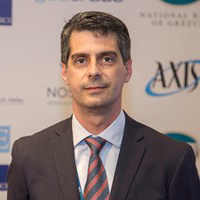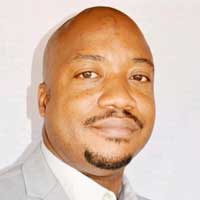Executive Master in
Future Energy
Join the pioneers of the new energy revolution
Programme Objectives
- Gain in-depth knowledge and perspective on a range of dominant energy technologies, industries, and markets
- Experience first-hand three key European energy markets and their main technologies (available in blended option only).
- Network with energy professionals from around the world
- Future-proof your energy management career
- Develop and implement a strategic mindset to address major energy issues in the corporate, entrepreneurial, financial, legal, social, or public sectors
- Strengthen your multicultural and cross-functional skills

Prof. Spiros PAPAEFTHIMIOU
Executive Master in Future Energy Global Academic Director
“On completing the programme, you will be able to influence the strategic direction of the businesses and organisations you will go on to lead, and be able to formulate a worldview that incorporates new imperatives…”
A new era in Sustainable Energy
In the global energy landscape, we notice tremendous efforts towards the incorporation of more sustainable electricity sources and a shift away from fossil fuels. Cleaner sources of energy have become a prerequisite in new installations and thus the new energy giants are renewable companies overtaking their fossil fuel based counterparts! A vital driver for these unprecedented facts is the belief that a global transition to cleaner fuels is the only chance we have of avoiding the most catastrophic effects of climate change.
In this continuously changing scenery which is full of opportunities, energy companies are challenged to shift from vertically integrated monopolies to entities that will adapt to unbundled and strongly competitive markets. Renewable energy generation is the new player which requires a different approach, i.e. integrating different decentralised sources, energy storage and strengthening links with the demand side. Importantly, flexibility is the key parameter to ensure adaptation of a transitioning energy system to decentralised power production and regionalisation of the electricity sector. On the other hand, in the post-pandemic era green investments will spearhead global economic recovery and will constitute a significant part of economic recovery packages, alongside specific requirements. Therefore, the push for increased share of renewables, new "smart" power grids, increased storage options, electrification of transportation, hydrogen and energy savings are now more powerful than in the past decades.
As a leading European business school, ESCP is involved in shaping the future of the energy industry. The Executive Master in Future Energy (EMFE) at ESCP educates the next generation of leaders and pioneering thinkers in the energy sector through a unique style of business education. Built on the principles of its successful Energy Management predecessor, the EMFE programme develops leadership practice immersed in real-world challenges in the energy sector, building upon a diverse community of ESCP faculty experts and world-leading professionals.
The curriculum is developed through the expertise of our grown networks in areas such as oil, gas, renewables, electricity and others, which are at the heart of the EMFE programme. The programme will deal with cutting-edge issues, providing academic knowledge blended with research subjects and practical industry based insights, and offer a modern overview of key knowledge, concepts and tools that are required to succeed in today’s energy sector.
During the course of the programme, participants will have a strong understanding of the energy eco-system as a whole and the importance of innovation, project implementation and sustainable business practices. Completing the programme will allow participants to influence the strategic direction of the businesses and organisations they lead and be able to formulate a world view that incorporates these new imperatives.
Key Facts
- A flexible, 18-month, part-time executive programme with the option of 100% online or blended learning, allowing participants to combine their studies with a full-time job
- Designed for students with a Master's degree and 5 years of professional experience, or a Bachelor's degree with 8 years of professional experience
- Active learning experience delivered with state-of-the-art tools
- Three European seminars (available in blended option) providing a unique international and multi-technology perspective
- Taught entirely in English
- Integrated International Consultancy Project
- Delivered by world-renowned faculty and industry practitioners
- Strong support from the Energy industry via our Energy Management Centre
- Excellent networking opportunities offered by our 80,000-strong alumni
- More than 40 professors and practitioners teaching on the programme
Two ways to study
18 months part-time
Designed for international professionals, the Executive Master in Future Energy offers a choice of online and blended learning. Both our online and blended learning will have hands-on learning opportunities with state-of-the-art learning tools and engagements with faculty and energy experts.
Blended
Participants will study online via live and asynchronous sessions and also attend three, one-week European seminars in London, Berlin and Madrid.
Online
The flexibility offered by this option allows participants to study 100% online wherever they are in the world via live and asynchronous sessions. Participants will have the option to upgrade their studies to blended learning to join the three European seminars in London, Berlin and Madrid.

Testimonial
Wafaa Saab (Beirut, Lebanon)
Head of Projects Control and Quality Management Department
Ramco Trading and Contracting S.A.L
Class of 2023
“As the undeniable impacts of climate change become increasingly apparent, I found myself driven to develop a skill set that would allow me to contribute positively to the future of our planet. I have always been convinced that the clean energy revolution is the game-changing catalyst that will redefine how we live our lives and interact with the world around us. The Executive Master in Future Energy (EMFE) blended programme at ESCP has not only provided me with the academic foundation I needed to immerse myself in this dynamic field but also inspired me to strive for a better tomorrow.
The diverse backgrounds of participants from across the globe, combined with the expert insights of highly qualified professors who possess both real-world and academic experience, have enriched my understanding and broadened my perspectives on the multifaceted challenges surrounding humanity's future energy needs. This collaborative environment has effectively complimented my civil engineering training, honing my critical thinking skills and enabling me to approach complex issues with innovative solutions.
Moreover, the European seminars have been an invaluable component of the programme, equipping us with both technical and interpersonal skills essential for success in the global energy sector. Engaging with various companies specializing in green energy and energy management, as well as visiting different power plants, has expanded my horizons and solidified my determination to play a pivotal role in shaping the global energy mix.”

The EMC 's Mission is to build a strategic partnership between academia, industry and government, to debate the challenges of the new energy era. It provides a platform for international dialogue through a wide range of events, publications and academic programs.
The ESCP Energy Society is a student association based at the London Campus. Its aim is to engage ESCP students in industry related events, maximize networking opportunities, and help develop professional skills.

Executive Master in
Future Energy
Curriculum
18 months part-time, online or blended
The EMFE is delivered over an intensive six modular format covering 22 courses, an international consultancy project (ICP), expert webinars and three one-week European seminars in London, Berlin and Madrid.
The course content will emphasise the development of specific skills in energy fundamentals, technologies, industries, and markets, as well as policies and strategies, with an eye toward the future challenges of investing in technology and tackling them.
Curriculum: 18 months, part-time
BLENDED: 22 courses taught via live and asynchronous sessions + Three one-week European Seminars in London, Berlin & Madrid + 1 International Consultancy Project + Expert Webinars + Company Visits
Programme Structure
Energy Fundamentals (February – May 2025)
- The new Energy Sector
- Energy Efficiency
- Sustainability in the Energy Sector
- European Seminar in Berlin (April 2026) & London (June 2025)
Energy Sources (June - September 2025)
- Future of the Energy Sector - Electrification
- Renewable Energy Sources
- Fossil Fuels
Energy Markets (September – January 2026)
- Energy & Emissions Trading
- Energy Laws and Regulations
- Energy Markets
- Energy Policy and Geopolitics
- European Seminar in Madrid
(September 2025)
Cutting Edges in Energy Transition (February – May 2026)
- Digital Transformation: Industry 5.0 - Energy 5.0
- Energy Commodities and Trade
- Energy and E-mobility
- Smart Grids and Future Energy Infrastructure
Energy Governance (June – July 2026)
- Innovations/New Services in the Energy Sector
- Governance of Energy projects
- Energy Risk Management
- Energy Project Evaluation and Financing
Managing for the Future of Energy
- Strategy (February – March 2025)
- Financial Management (July 2025)
- Marketing in a Globalised World (December 2025)
- People and Change Management (May 2026)
Additional Programme Elements (Cross-Module Activities)
- Consultancy Project (ICP)
- European Seminars in London and Madrid
- Expert Webinars
- Company Visits
The Consultancy Project
The integrated Consultancy Project is a key component of the programme, designed to provide participants with a collaborative, multi-disciplinary learning experience.
It is an 8-10 months team project that will allow EMFE participants the opportunity to perform an analysis of real-life problems and opportunities and produce a series of solutions which can be implemented to meet the strategic challenge at hand.
Additionally, it will provide an opportunity to consolidate their understanding of the concepts and tools presented during the programme.
Consultancy Projects begin around 3 months into the programme.
Curriculum:18 MONTHS, PART TIME
ONLINE: 22 courses taught via live and asynchronous sessions + 1 International Consultancy Project + Expert Webinars + Company Visits
Programme Structure
Energy Fundamentals (February – May 2025)
- The New Energy Sector
- Energy Efficiency
- Sustainability in the Energy Sector
Energy Sources (June - September 2025)
- Future of the Energy Sector - Electrification
- Renewable Energy Sources
- Fossil Fuels
Energy Markets (September – January 2026)
- Energy and Emissions Trading
- Energy Laws and Regulations
- Energy Markets
- Energy Policy and Geopolitics
Cutting Edges in Energy Transition (February – May 2026)
- Digital Transformation: Industry 5.0 - Energy 5.0
- Energy Commodities and Trade
- Energy and E-mobility
- Smart Grids and Future Energy Infrastructure
Energy Governance (June – July 2026)
- Innovations/New Services in the Energy Sector
- Governance of Energy projects
- Energy Risk Management
- Energy Project Evaluation and Financing
Managing for the Future of Energy
- Strategy (February – March 2025)
- Financial Management (July 2025)
- Marketing in a Globalised World (December 2025)
- People and Change Management (May 2026)
Additional Programme Elements (Cross-Module Activities)
- Consultancy Project (ICP)
- Expert Webinars
- Company Visits
The Consultancy Project
The integrated Consultancy Project is a key component of the programme, designed to provide participants with a collaborative, multi-disciplinary learning experience.
It is an 8-10 months team project that will allow EMFE participants the opportunity to perform an analysis of real-life problems and opportunities and produce a series of solutions which can be implemented to meet the strategic challenge at hand.
Additionally, it will provide an opportunity to consolidate their understanding of the concepts and tools presented during the programme.
Consultancy Projects begin around 3 months into the programme.

Testimonial
Norma BUESO (San Pedro Sula, Honduras)
Managing Director at Hidroeléctricas de Occidente, S.A.
Class of 2021
"The Executive Master in Energy Management is a highly practical programme for professionals in search of expanding their strategic thinking and industry know-how. Attending the modules in different countries allowed us to visit and meet different companies under different environments and cultures, further enriching the experience. Each professor brought to the classroom a world of experience and insight on the industry, as well as encouraged intellectual discussions, not just for personal growth but also applicable to our day to day work. We also received workshops on research, trading, and other fun dynamics. I am very proud to have been a part of this programme. As a lawyer from Honduras working in renewable energy, the knowledge and understanding acquired through this programme on foreign energy markets and different technologies has expanded my opportunities as a global energy professional."

The EMC 's Mission is to build a strategic partnership between academia, industry and government, to debate the challenges of the new energy era. It provides a platform for international dialogue through a wide range of events, publications and academic programs.
The ESCP Energy Society is a student association based at the London Campus. Its aim is to engage ESCP students in industry related events, maximize networking opportunities, and help develop professional skills.

Executive Master in
Future Energy
Student profiles
37
average age
23
nationalities
13.5
years of experience
Country Breakdown
Europe
53%
Austria, Cyprus, Denmark, France, Greece, Germany, Italy, Macedonia, Netherlands, Norway, Russia, Spain, Switzerland, Ukraine, United Kingdom
Americas
20%
Brazil, Canada, Chile, Colombia, United States, Venezuela
Africa &
Middle East
16%
Iran, Lebanon, Nigeria, Senegal, Turkey
Asia Pacific
11%
Azerbaijan, India, Mongolia, Philippines, Singapore, South Korea
Previous Studies
Industry Diversity

Testimonial
Sékou Coulibaly (Bamako, Mali)
Co-founder and Co-Managing Director
Afrilight Energy
Class of 2023
“Joining the EMFE 2022 intake, I was initially wondering if the programme would live up to my expectations, enabling me to deepen my understanding of the ever-evolving energy landscape. However, within the first few weeks, my doubts were put to rest. Each class unveiled a new, fascinating realm for me to explore, and the dedicated professors consistently made connections to current events, ensuring that our learning remained relevant and applicable.
In addition to the enriching educational experience, the programme also introduced me to an incredible community of individuals. From the committed teaching staff and management to the diverse array of students, I encountered exceptional people who have enriched my life in countless ways. Some have become cherished friends, while others have evolved into valued business partners.
Indeed, ESCP fosters an environment where synergistic relationships can flourish, paving the way for the creation of innovative businesses that have the potential to transform the energy sector. The EMFE programme is so much more than just an academic pursuit; it's an inspiring journey that connects like-minded individuals, empowering them to shape a more sustainable future together.”

The EMC 's Mission is to build a strategic partnership between academia, industry and government, to debate the challenges of the new energy era. It provides a platform for international dialogue through a wide range of events, publications and academic programs.
The ESCP Energy Society is a student association based at the London Campus. Its aim is to engage ESCP students in industry related events, maximize networking opportunities, and help develop professional skills.

Executive Master in
Future Energy
Admissions
Admission Requirements
- Master degree with at least 5 years of professional experience or Bachelor degree with at least 8 years of professional experience
- Provide two reference letters
- Be highly motivated, and demonstrate your abilities and determination to carry out educational projects alongside your professional life.
- Fluency in English *.
*For non-native English speakers, we require the following minimum scores: TOEFL: 100; IELTS: band 7. If you are a non-native English speaker who has previously studied or worked for more than two years in an English-speaking country, you are exempt from providing one of these. You will, however, have to be assessed by the selection committee during your admission interview.
Admissions procedure
Step 1: Online Application
Applications are processed on a first-come, first served basis. As places on the programme are limited, we therefore advise you submit your application as early as possible.
Complete the online application.
The main elements of the application include:
- Copies of diplomas/bachelor/master degrees
- Up-to-date CV
- Two references
- Copy of passport
- Photo in jpeg or png format
Step 2: Admission Interview
Each candidate will be interviewed by a jury panel including the Programme Directors. An online interview can be offered to candidates if required.
Step 3: Offer Confirmation
Admission decisions are sent out by email within 4 weeks of the submission of the application.

The EMC 's Mission is to build a strategic partnership between academia, industry and government, to debate the challenges of the new energy era. It provides a platform for international dialogue through a wide range of events, publications and academic programs.
The ESCP Energy Society is a student association based at the London Campus. Its aim is to engage ESCP students in industry related events, maximize networking opportunities, and help develop professional skills.

Executive Master in
Future Energy
Fees & Financing
Fees
- Tuition for the programme is set for the 2025 intake
- There is a non-refundable application fee of €250 for all applicants
- Tuition fees are subject to change by the 1st August of each year
BLENDED OPTION
£23,000
ONLINE OPTION
£17,000 (participants can upgrade to the blended option by paying the difference)
Tuition fees include:
- 360 teaching hours
- Basic books and documentation
The following costs are not included:
- Travel
- Accommodation
Scholarships
We offer six categories of scholarships to participants entering the EMFE in 2025.
These are available for the following participant categories:
- Women in leadership
- Entrepreneurship
- Those working for NGO/Not-for-profit organizations
- Those working in a Small or Medium Sized Enterprises (SME; less than 250 employees)
- Individuals based in Emerging Markets
- Sustainability Pioneer
Scholarship applications must be submitted together with the programme application. Please contact the EMFE Recruitment & Admissions Team for more information.

The EMC 's Mission is to build a strategic partnership between academia, industry and government, to debate the challenges of the new energy era. It provides a platform for international dialogue through a wide range of events, publications and academic programs.
The ESCP Energy Society is a student association based at the London Campus. Its aim is to engage ESCP students in industry related events, maximize networking opportunities, and help develop professional skills.


